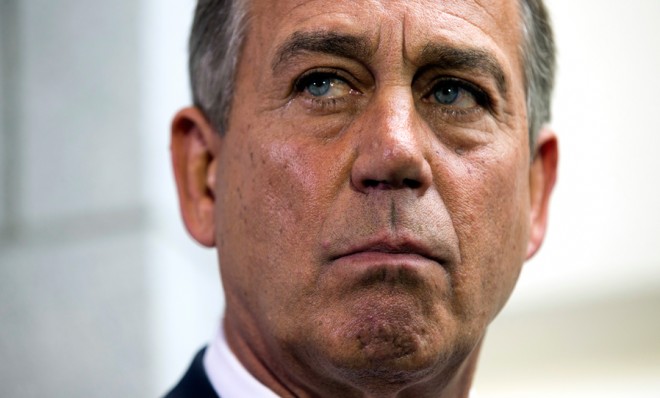How a few dozen conservatives can thwart the rest of the GOP
The Tea Party is proving the old adage about a vocal minority


A free daily email with the biggest news stories of the day – and the best features from TheWeek.com
You are now subscribed
Your newsletter sign-up was successful
To end the government shutdown, all Speaker John Boehner (R-Ohio) has to do is bring a clean continuing resolution up for a vote that makes no mention of ObamaCare. And according to reports, most Republicans in the House would be game for such a plan, not to mention the chamber's Democrats.
So what gives?
Boehner has had to strike a delicate balance in his caucus since January, when diehard conservatives tried to oust him from the speakership. The uprising "crippled" him, says National Review's Robert Costa, leaving him unwilling to cut off that vocal wing for fear of losing his post. As a result, "he knows a clean [continuing resolution] has never been an option for him."
The Week
Escape your echo chamber. Get the facts behind the news, plus analysis from multiple perspectives.

Sign up for The Week's Free Newsletters
From our morning news briefing to a weekly Good News Newsletter, get the best of The Week delivered directly to your inbox.
From our morning news briefing to a weekly Good News Newsletter, get the best of The Week delivered directly to your inbox.
The leadership vacuum has allowed Sen. Ted Cruz (R-Texas) to wield more clout than Boehner himself in guiding the party's budget strategy. With powerful Tea Party groups behind him, Cruz pushed the defund-ObamaCare tactic in the first place, and has since kept it alive.
Further, while the numbers for a clean continuing resolution may appear to be there, they are fluid. GOPers who may privately want to drop the party's demands are, under pressure from the right, unwilling to do so in public.
The Republican majority is relatively small. The party holds 233 seats, and need 217 votes to pass a bill. But there are an estimated 30 to 40 hardline conservatives who refuse to budge, no matter what. And there's another few dozen who are on the fence, and who have, to this point, been pulled into Cruz's camp come vote time.
Therefore, even if Boehner in theory has the support to pass a bill, he would need a significant swath of Democratic votes to do so — something he'd prefer to avoid. The right is already deeply mistrustful of Boehner, and would openly revolt if he helped pass a plan backed by more Dems than Republicans.
A free daily email with the biggest news stories of the day – and the best features from TheWeek.com
Plus, Democrats are unified in their opposition to Republican demands, leaving Boehner with no choice but to deal only with his caucus.
"The combination of those two factors — a close Republican majority and united Democratic opposition — gives those 30 Republicans their power," explains the Washington Examiner's Byron York. "In a situation where Democrats nearly unanimously oppose a bill, the 30 can make the difference between success or failure for Boehner. If they stick together, Boehner can't win."
Boehner could cut out the Tea Party and bring up a clean bill that would pass with full Democratic support. Yet he would risk losing much of his caucus — not only the hardliners — in the process, further fracturing the party and endangering his job.
Jon Terbush is an associate editor at TheWeek.com covering politics, sports, and other things he finds interesting. He has previously written for Talking Points Memo, Raw Story, and Business Insider.
